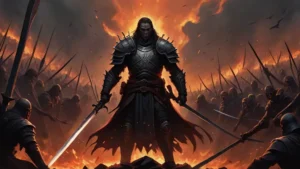Who Were the Major Players of 1923-1954? Exploring the Key Figures of a Transformative Era
Sayam Ali September 4, 2024 0
The years between 1923 and 1954 were filled with dramatic changes and influential figures who shaped the course of history. From the roaring twenties to the post-war world, this period saw the rise and fall of many important personalities. In this article, we will explore some of the major players of 1923-1954, delving into their lives, achievements, and the impact they had on the world. Understanding these key figures helps us appreciate how their actions and decisions helped mold the modern world we live in today.
1. Franklin D. Roosevelt (1882-1945)
Franklin D. Roosevelt, often known as FDR, was one of the most significant leaders of this era. He served as the President of the United States from 1933 until his death in 1945. Roosevelt’s leadership during the Great Depression and World War II was crucial. He introduced the New Deal, a series of programs aimed at providing relief, recovery, and reform to the American people during the economic hardship of the 1930s. His policies helped stabilize the economy and provided support to millions of Americans.
Roosevelt also played a key role in shaping the Allied strategy during World War II. He worked closely with leaders like Winston Churchill and Joseph Stalin to defeat the Axis powers. Roosevelt’s vision and diplomacy helped lay the groundwork for the post-war world order and the establishment of the United Nations.
2. Adolf Hitler (1889-1945)
Adolf Hitler was the leader of Nazi Germany and a central figure in world history during this period. He became Chancellor of Germany in 1933 and later established a totalitarian regime. Hitler’s aggressive expansionist policies and ideology of racial superiority led to World War II and the Holocaust. His actions resulted in immense suffering and loss of life across Europe.
Despite the devastation he caused, understanding Hitler’s role is important to grasp the full scope of this era. His influence on global politics and history was profound, and his actions had lasting repercussions on international relations and human rights. You Can Also Read This Everything You Need to Know About Vivitar Trimmers
3. Winston Churchill (1874-1965)
Winston Churchill was a British statesman who served as Prime Minister of the United Kingdom during World War II. His speeches and leadership inspired the British people to stand firm against Nazi Germany. Churchill’s determination and strategic vision were key to the Allied victory.
Churchill’s influence extended beyond the war. He was also a prolific writer and historian, earning the Nobel Prize in Literature in 1953. His post-war work, including his role in the establishment of the Iron Curtain and the early stages of the Cold War, solidified his place as a major figure in mid-20th-century politics.
4. Joseph Stalin (1878-1953)
Joseph Stalin was the leader of the Soviet Union from the mid-1920s until his death in 1953. His leadership transformed the Soviet Union into a major world power, though at a great cost. Stalin implemented a series of five-year plans aimed at rapidly industrializing the country. These plans led to significant economic growth but also caused widespread suffering due to forced collectivization and political purges.
Stalin’s role in World War II was also significant. His leadership during the war helped to repel the Nazi invasion and contributed to the eventual defeat of Germany. However, his post-war policies and actions, including the establishment of Soviet influence over Eastern Europe, had a lasting impact on global geopolitics.
5. Mahatma Gandhi (1869-1948)
Mahatma Gandhi was a leader in the Indian independence movement against British rule. Known for his philosophy of non-violence and civil disobedience, Gandhi played a crucial role in India gaining independence in 1947. His methods and principles of peaceful protest inspired movements for civil rights and freedom across the world.
Gandhi’s impact was not limited to India. His ideas influenced many leaders and movements globally, including the American civil rights movement led by Martin Luther King Jr. Gandhi’s legacy is one of courage, non-violence, and unwavering commitment to justice.
6. Albert Einstein (1879-1955)
Albert Einstein was a renowned physicist whose work revolutionized the understanding of space, time, and energy. His theory of relativity fundamentally changed the field of physics and earned him the Nobel Prize in Physics in 1921. Einstein’s contributions were not limited to science; he was also a passionate advocate for peace and civil rights.
During this period, Einstein’s influence extended beyond the scientific community. His ideas and advocacy helped shape public perception of science and its role in society. Despite facing significant challenges, including fleeing from Nazi Germany, Einstein remained a prominent figure in global science and politics.
7. Benito Mussolini (1883-1945)
Benito Mussolini was the founder of Fascism and the leader of Italy during World War II. He came to power in 1922 and established a totalitarian regime. Mussolini’s aggressive foreign policy and alliance with Hitler contributed to the outbreak of World War II.
Mussolini’s impact on Italy and Europe was significant, although his regime ultimately led to his downfall. His leadership style and policies had a lasting effect on Italian politics and European history. Understanding Mussolini’s role helps provide a comprehensive view of the political landscape of the time.
8. Eleanor Roosevelt (1884-1962)
Eleanor Roosevelt was a prominent American diplomat, activist, and First Lady of the United States. As the wife of Franklin D. Roosevelt, she played a key role in advocating for social issues, including human rights and women’s rights. Her work extended beyond her husband’s presidency, influencing public policy and international affairs.
Eleanor Roosevelt was a founding member of the United Nations and played a critical role in drafting the Universal Declaration of Human Rights. Her contributions to human rights and her advocacy for marginalized groups left a lasting legacy.
9. Charles Lindbergh (1902-1974)
Charles Lindbergh was an American aviator who gained worldwide fame for his solo nonstop flight across the Atlantic Ocean in 1927. His achievement not only advanced aviation technology but also captured the imagination of people around the world.
Lindbergh’s impact extended beyond his flying career. He became a prominent public figure, involved in various social and political issues. His contributions to aviation and his role in promoting international understanding make him a notable figure of this period.
10. Jean-Paul Sartre (1905-1980)
Jean-Paul Sartre was a French philosopher, playwright, and novelist known for his work in existentialism and phenomenology. His philosophical ideas, particularly those expressed in his book Being and Nothingness, had a significant impact on 20th-century thought.
Sartre’s work influenced not only philosophy but also literature and political thought. His ideas about human freedom, responsibility, and the nature of existence resonated with many during this period and continue to be relevant today.
Conclusion
The period between 1923 and 1954 was marked by the actions and ideas of numerous influential figures who shaped the course of history. From political leaders and scientists to activists and thinkers, each of these individuals made significant contributions to their respective fields and the world at large. By examining their lives and achievements, we gain a deeper understanding of the transformative events and ideas that defined this era. These major players of 1923-1954 not only influenced their time but also left a lasting legacy that continues to impact the present day.








